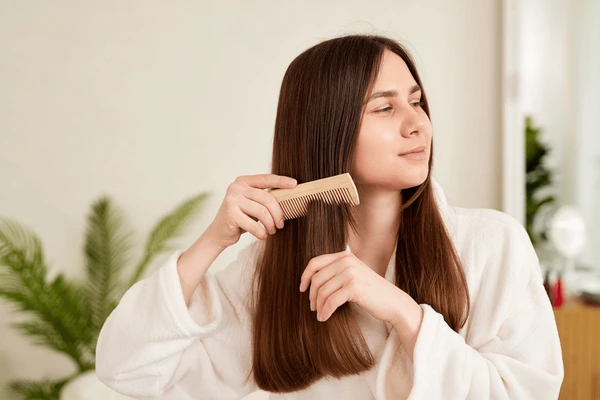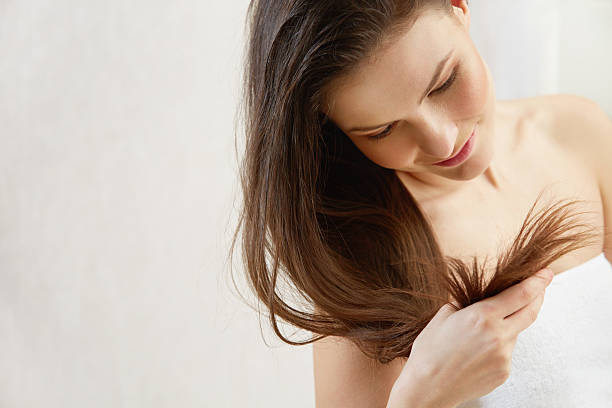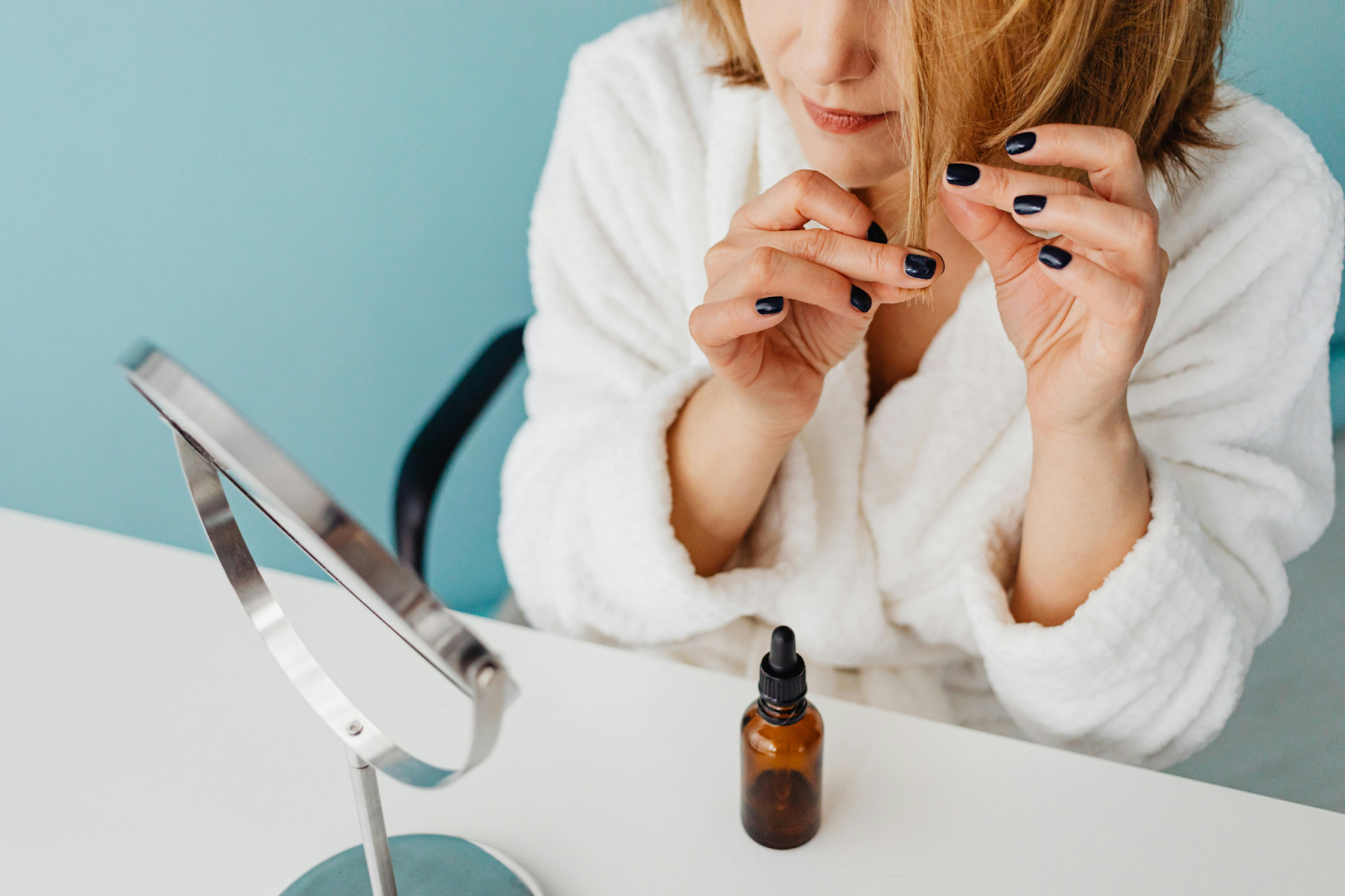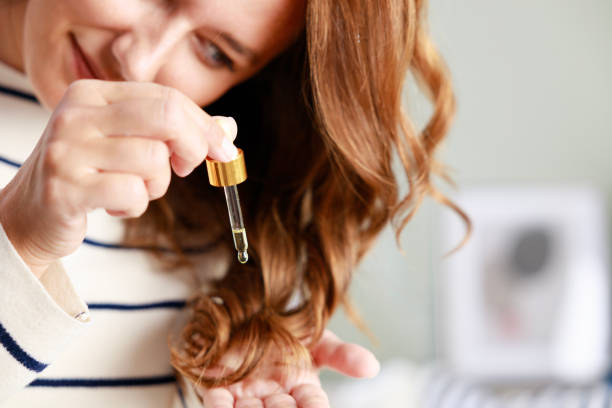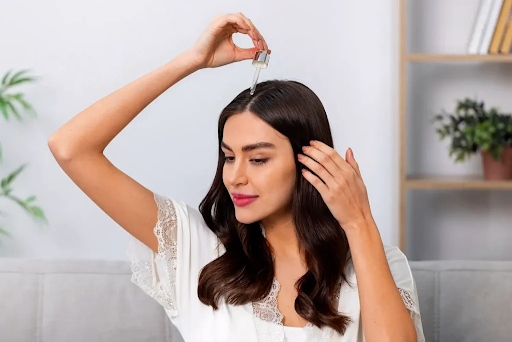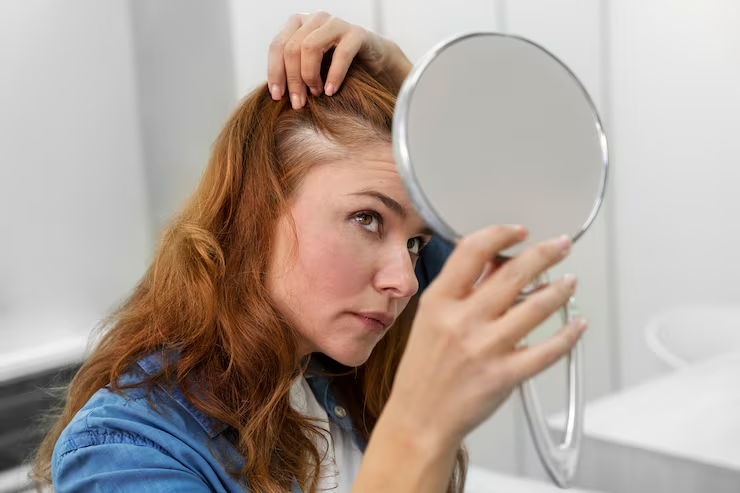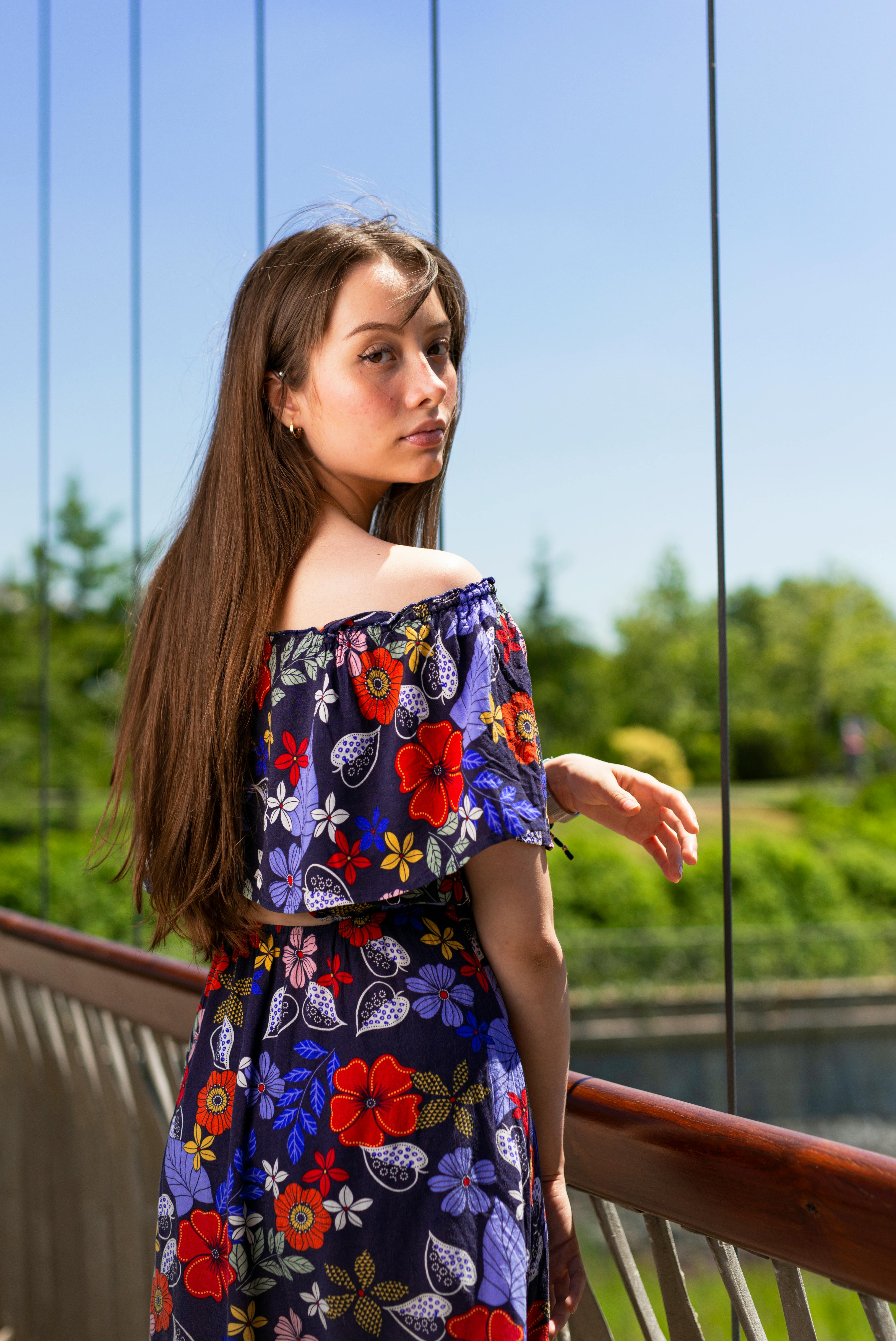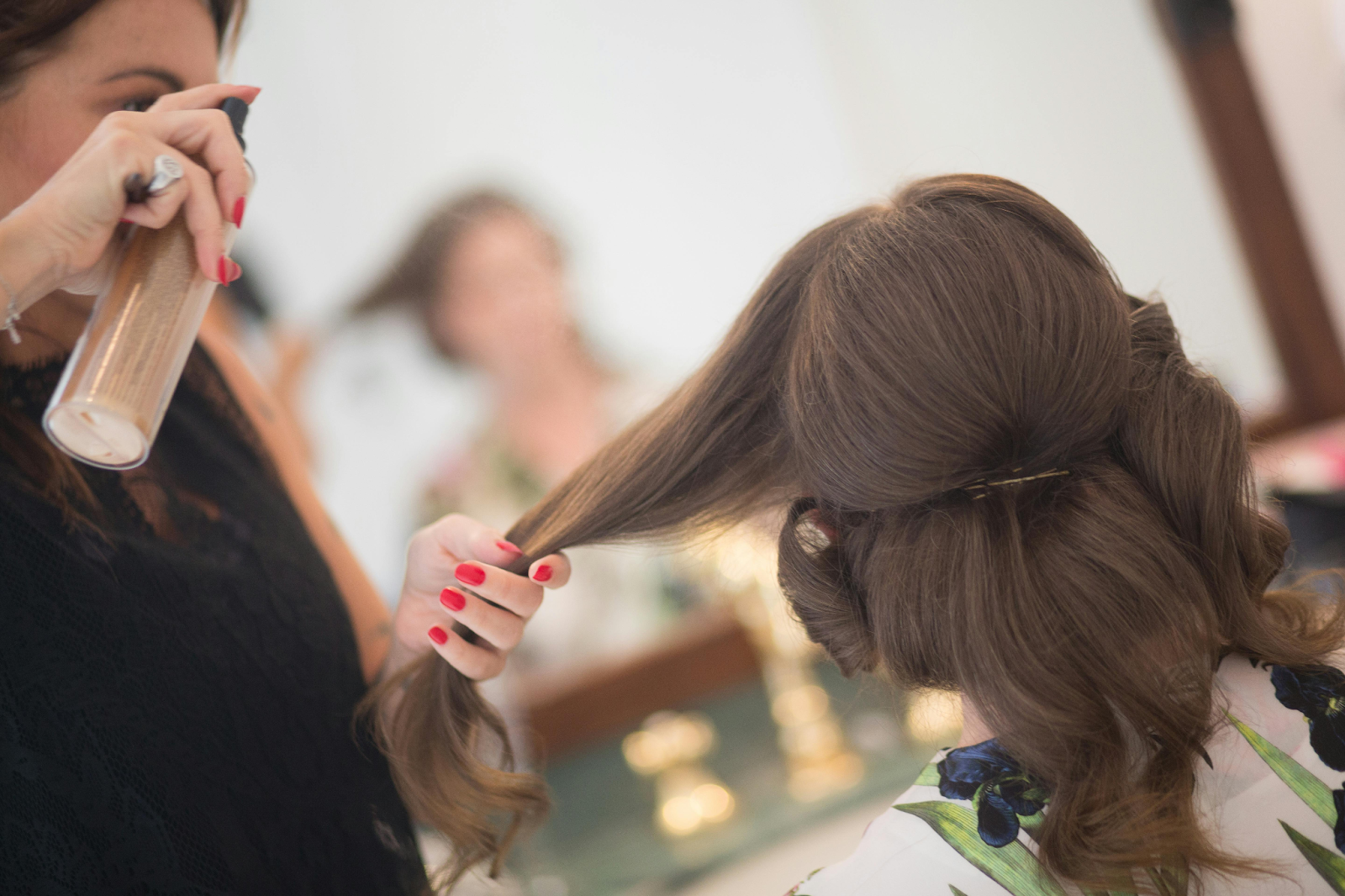Menopause & Hair Loss: Causes & Tips to Prevent Shedding
BY TRYBELLO
May 22, 2025

Key Takeaways
- Hormonal changes during menopause, particularly a decrease in estrogen and progesterone, can lead to hair loss.
- Early signs of menopausal hair loss include increased hair shedding and noticeable thinning.
- Stress management and a balanced diet rich in essential vitamins and minerals can help mitigate hair loss.
- Natural hair products and herbal supplements offer supportive benefits for hair health.
- Trybello Hair Helper Spray is a hormone-free solution specifically beneficial for menopausal hair thinning with its unique blend of biotin, caffeine, and castor oil that work together to stimulate follicle activity and promote noticeable hair growth.
Hormonal Changes and Hair Loss
As you journey through menopause, your body undergoes a myriad of changes, many of which are influenced by hormones. Among these changes, hair loss is a common yet often unexpected challenge. The key players in this process are the hormones estrogen and progesterone.
Impact of Estrogen and Progesterone
Estrogen and progesterone are hormones that work together to keep hair in the growth phase for longer periods, resulting in thicker and healthier locks. However, during menopause, the levels of these hormones drop significantly.
This decrease in hormone levels can cause hair follicles to shrink, leading to thinner hair strands and increased hair shedding. It's a natural process, but it can be distressing to see your hair thinning over time.
Role of Androgens in Hair Thinning
Besides the decline in estrogen and progesterone, androgens also play a role in menopausal hair loss. Androgens are male hormones present in smaller amounts in women, and during menopause, their relative levels can increase due to the drop in female hormones.
This hormonal imbalance can cause hair follicles to shrink and produce thinner, weaker hair.

Some women may even notice a pattern similar to male-pattern baldness, where hair thins on the top and front of the scalp.
“Doctor-Approved Natural Spray Rapidly Boosts Growth & Thickness.
Why 100,000+ Women Are Switching to The TryBello All-Natural Solution!"
Join over 100,000 happy customers who’ve transformed their hair with our natural, doctor-formulated spray—rated 4.8/5 by more than 40,000 real users.
Proven Natural Ingredients
- • Caffeine Extract – Naturally blocks DHT and boosts blood flow to hair follicles
- • Biotin – Absorbs directly through the scalp for maximum results—no pills needed
- • Castor Oil – Soothes inflammation and locks in deep, lasting moisture
- • Rice Water Extract – Packed with proteins and minerals to strengthen hair and reduce shedding
Get Visible Results in 12 Weeks
- • Up to 45% increase in hair thickness
- • Reduces shedding and unclogs hair-draining nightmares
- • Supports regrowth in thinning areas
- • Leaves hair soft, shiny, and full of life
Ironclad 120-Day Growth Guarantee
No results after 4 months? Get 100% of your money back—no questions asked.


★★★★★
I started using this twice a day because I noticed my hairline receding. Didn’t pay attention to track results, now my stylist told me my hair has grown a lot since my last root touch up. I'm impressed! - Bailey

Symptoms of Menopausal Hair Loss
Early Signs to Recognize
Early signs of menopausal hair loss include increased hair shedding and a noticeable change in hair density.

You might find more hair in your brush or notice that your ponytail feels thinner.
Observing these changes can help you act quickly. For example, if you usually shed about 50 to 100 hairs a day, but suddenly notice much more, it might be time to consider possible hormonal changes as a cause.
Changes in Hair Texture and Volume
As menopause progresses, you might notice changes in the texture and volume of your hair. Hair may become more brittle, losing its natural shine and bounce. This change can be attributed to the hormonal shifts affecting the hair's natural moisture and elasticity.
Also, understanding these changes can empower you to seek solutions that support your hair's health and resilience. Whether through lifestyle adjustments or natural remedies, there are ways to nurture your hair through this transition.
Preventive Measures for Menopausal Hair Loss
Balanced Nutrition for Healthy Hair

Your diet is a cornerstone of hair health.
Ensure you consume a variety of foods rich in vitamins and minerals essential for hair growth. Vitamins A, C, D, and E, along with zinc and iron, are particularly beneficial.
For example, leafy greens, nuts, seeds, and fatty fish are excellent sources of these nutrients. Incorporating these foods into your daily meals can make a significant difference in the strength and vitality of your hair.
Effective Stress Management Techniques
Stress is a significant factor that can exacerbate hair loss. Implementing stress management techniques can help maintain hormonal balance and promote overall well-being.
Consider activities like yoga, meditation, or simply taking a daily walk. These practices can help reduce stress levels, improve mood, and support healthy hair growth.
Gentle Hair Care Practices
Opt for shampoos and conditioners that are free of sulfates and parabens, as these chemicals can strip your hair of its natural oils.
Additionally, limit the use of heat styling tools and go for air drying whenever possible. Regular scalp massages can also enhance blood flow, promoting healthier hair growth.
Natural Remedies for Supporting Hair Health
Supplements
Natural supplements can provide vital support for hair health. Saw palmetto, for instance, is often used to balance hormones and reduce hair loss. Similarly, Anagain strengthens your strands and promotes hair growth.
Before starting any supplement, consult with a healthcare provider to ensure it's appropriate for your needs and won't interfere with any medications you may be taking.
Essential Oils and Their Benefits
Essential oils can be a wonderful addition to your hair care regimen. Rosemary oil in particular is celebrated for its ability to stimulate hair growth and improve scalp health.
To use essential oils, mix a few drops with a carrier oil like coconut oil or jojoba oil and massage it into your scalp. This nourishes your hair and helps you relax.
When to Seek Professional Help
Recognizing Severe Hair Loss
If you notice significant hair thinning or bald patches, consult a healthcare professional. These could be signs of underlying health issues that require medical intervention.
Ultimately, understanding your body and its changes during menopause empowers you to take control of your hair health.
Medical Interventions for Hair Preservation
When lifestyle changes and natural remedies aren't enough, medical interventions can offer a more targeted approach to hair preservation during menopause.
Treatments like Platelet-Rich Plasma (PRP) therapy, which involves injecting platelets from your blood into the scalp can promote hair growth. This treatment has shown promising results, but it typically requires multiple sessions to see significant improvements.
Embracing Hair Wellness During Menopause with Trybello

Managing the challenges of menopause requires understanding, patience, and the right tools to maintain your health and confidence. That’s why our Hair Helper Spray is your ally.
With a hormone-free formula that works with your body's natural processes rather than against them, Trybello Hair Helper Spray uses the power of three scientifically-backed ingredients that specifically address menopausal hair concerns: biotin rebuilds hair structure from within,caffeine awakens dormant follicles affected by dropping estrogen levels, and castor oil improves microcirculation precisely when your follicles need it most.
What truly sets our formula apart is the addition of Angelica Polymorpha Sinensis Root Extract, traditionally known as "female ginseng," which has been used for centuries to support women through hormonal transitions.
For best results during menopause, apply 5–7 sprays to your scalp daily, focusing on areas where thinning is most noticeable, then gently massage for 30 seconds to activate the ingredients and stimulate blood flow. The lightweight spray format ensures these potent ingredients penetrate deeply to the hair follicle without weighing down existing hair or leaving residue.
Our 120-day growth guarantee reflects our confidence in providing real solutions for women experiencing menopausal hair changes. During menopause, your body deserves extra care and attention, not harsh chemicals or synthetic hormones.
TRY YOUR BELLO HAIR HELPER SPRAY NOW →
Frequently Asked Questions (FAQs)
Trending Topics
See our latests posts #TRYBELLO



